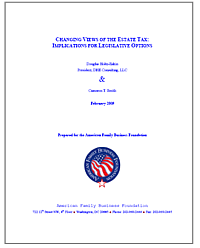San Francisco, July 6, 2009 – California could add some 180,000 new jobs at no cost to taxpayers if the federal estate tax were repealed, according to research by the former director of the nonpartisan Congressional Budget Office, Douglas Holtz-Eakin. The research was conducted for the nonprofit American Family Business Foundation (AFBF) in Washington, DC.

Holtz-Eakin, who served as chairman of the economics department at Syracuse University before going to Washington, estimated in his study that repeal of the estate tax, which impacts mostly small and family business owners and the owners of family farms, would lead to an increase of 1.5 million jobs nationwide. The state estimate is calculated based on the percentage of small-business jobs nationally located in California.
“In the midst of tough economic times, it seems obvious that members of our congressional delegation would support a measure that could boost employment without boosting taxes or the deficit. Repealing the estate tax, or the ‘Death Tax’ as it is commonly known, could do just that,” said Jason Clemens, director of research at the Pacific Research Institute. “If there is one thing California could use, it’s an increase in the number of available jobs.”
Under current law, the estate tax is assessed at a 45 percent rate on assets in an estate exceeding $3.5 million. Legislation passed during the Bush administration has slated the tax to sunset – or expire – at the end of 2009, only to return in 2011 at a higher rate.
Congress is expected to take some action on the estate tax this fall, before the “sunset” provision kicks in. In his first budget proposal, President Barack Obama proposed a permanent estate tax rate of 45 percent on estates valued over $3.5 million. Some lawmakers are pressing to raise the rate and lower the exclusion, while others would like to do just the reverse.
“What is certain is that the future of the estate tax should be decided based on facts and not rhetoric,” Mr. Clemens said. “If doing away with the estate tax will trigger the creation of more jobs at no cost to taxpayers, then it would make good sense to eliminate the tax.”
California Could Add Nearly 180,000 New Jobs at No Cost to Taxpayers
Pacific Research Institute
San Francisco, July 6, 2009 – California could add some 180,000 new jobs at no cost to taxpayers if the federal estate tax were repealed, according to research by the former director of the nonpartisan Congressional Budget Office, Douglas Holtz-Eakin. The research was conducted for the nonprofit American Family Business Foundation (AFBF) in Washington, DC.
Holtz-Eakin, who served as chairman of the economics department at Syracuse University before going to Washington, estimated in his study that repeal of the estate tax, which impacts mostly small and family business owners and the owners of family farms, would lead to an increase of 1.5 million jobs nationwide. The state estimate is calculated based on the percentage of small-business jobs nationally located in California.
“In the midst of tough economic times, it seems obvious that members of our congressional delegation would support a measure that could boost employment without boosting taxes or the deficit. Repealing the estate tax, or the ‘Death Tax’ as it is commonly known, could do just that,” said Jason Clemens, director of research at the Pacific Research Institute. “If there is one thing California could use, it’s an increase in the number of available jobs.”
Under current law, the estate tax is assessed at a 45 percent rate on assets in an estate exceeding $3.5 million. Legislation passed during the Bush administration has slated the tax to sunset – or expire – at the end of 2009, only to return in 2011 at a higher rate.
Congress is expected to take some action on the estate tax this fall, before the “sunset” provision kicks in. In his first budget proposal, President Barack Obama proposed a permanent estate tax rate of 45 percent on estates valued over $3.5 million. Some lawmakers are pressing to raise the rate and lower the exclusion, while others would like to do just the reverse.
“What is certain is that the future of the estate tax should be decided based on facts and not rhetoric,” Mr. Clemens said. “If doing away with the estate tax will trigger the creation of more jobs at no cost to taxpayers, then it would make good sense to eliminate the tax.”
Nothing contained in this blog is to be construed as necessarily reflecting the views of the Pacific Research Institute or as an attempt to thwart or aid the passage of any legislation.